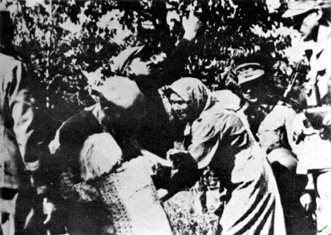It’s 1935, and Germany’s birthrate is nosediving. To Heinrich Himmler, it must have felt like an injustice on nature’s part. He set out to rectify this heinous mistake by establishing the Lebensborn Program, a grand scheme aiming to boost the Aryan population to 120 million.
Originally the program consisted of several nurseries set up around the Third Reich, safe havens where women could have their children in peace and comfort. For thousands of unwed mothers this seemed like a godsend. It was safe at the nursery. If they had the baby there, nobody would ever find out. All they had to do was pass a racial purity test to get inside.
Himmler encouraged his SS men to father as many children as possible. With the war raging in Europe, they needed new stock to replace war casualties. Thousands were born in Germany alone, and productive women were awarded the Mother’s Cross.
After the babies were born, they were often christened in a special SS ceremony in which a dagger was held over the child and the mother swore allegiance to the Nazi Party. If she didn’t wish to keep the infant, it would be adopted out to an Aryan family.
 |
| A girl undergoes testing to see if she is "racially valuable." |
As the Nazis advanced into neighboring countries such as Poland, Russia and Ukraine, the Program evolved to include the kidnapping of local children who ‘looked Aryan.’ Nearly 200,000 boys and girls were taken from Poland alone. Some were orphans, but a others were literally torn from their mothers’ arms and shipped to Lebensborn homes.
Upon arrival, the children underwent a series of tests to see if they were “racially valuable.” Those who passed were sent to German boarding schools or to Aryan foster families; those who failed went to concentration camps.
For the “racially valuable” children, this was just the beginning of a strange new life. They were forbidden to speak their native languages and more or less brainwashed into accepting Nazi propaganda. Those who resisted were savagely beaten.
As the Allies made progress into Germany, soldiers began to uncover Lebensborn homes. American troops found 300 children at a clinic in Steinhoering--most of the adults had fled, and the kids were on their own. I’m sure it was a shock to the soldiers. What were they supposed to do with all these babies?
The majority were put up for adoption, some were repatriated to their home countries, and still others refused to leave Germany, having embraced Nazi propaganda. Unfortunately only 25,000 returned to their families.
 |
| Kidnapping of a Polish (?) boy |
As you might expect, children from Lebensborn clinics have had difficulty fitting in after the War. Caught in the no-man’s-land between the Axis and the Allies, neither side seemed willing to accept them. To the Germans, Lebensborn children were an embarrassment, a reminder of their defeat. The Allied countries condemned them as “German kids,” and many were denied reentry into their home countries.
For the babies born at the clinic, there was often some confusion about the identity of their fathers. Most Lebensborn mothers refused to answer their children’s questions, and the kids had to do a bit of detective work.
"My mother told me my father was a truck driver for the Luftwaffe who had never fired a gun and died in Croatia when he drove over a landmine. She told me she had married him in 1938 on a beautiful sunny day and that they had driven to church in a horse-drawn cart. She said she didn't want to say any more about him because it was too painful," said Guntram Weber, a child from the Lebensborn Program. "But there were no documents and no photos.”
After a bit of digging, Weber discovered that his father was an SS major-general, convicted of war crimes and sentenced to death. However, he had escaped to Argentina and died peacefully.
“From one day to the next I knew my father was a war criminal. He was a man who allowed himself everything. And the SS enabled him to live that way. I assume my mother fell in love with a powerful military man. And he obviously couldn't resist any woman. It gave me a feeling of low self-esteem, of loneliness, of uncertainty.”

No comments:
Post a Comment